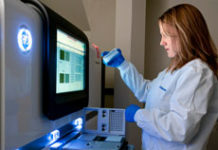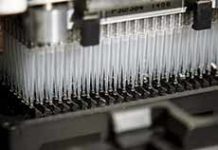Cancer Research UK has deepened its commitment to good research practice by becoming a signatory of the Concordat to Support Research Integrity. Here we speak with two Research Integrity Advisers at our institutes to find out why supporting scientists to be the best they can be is the only way to ensure quality research…

Research integrity is the cornerstone of good science. For the cancer research community this is important, not just because conducting research according to the highest standards is the ‘right’ thing to do, but because it is the most effective way to bring forward the day when all cancers are cured.
Cancer Research UK (CRUK) wants to support the most impactful science, and how that science is carried out is a vital part of this. To be impactful, research needs first to be reliable, repeatable and trustworthy. This is why our grants carry specific research integrity conditions, it is also why we have signed the Concordat to Support Research Integrity – a commitment to the highest standards of rigor and integrity in all aspects of research.
“Our roles aren’t about policing – they really are about supporting and being advocates for good research practice.”
Two CRUK institutes have gone further still in their commitment to this and have appointed dedicated research integrity advisers to not only uphold standards, but also facilitate training and guidance. It’s a wide remit, and to understand their roles it’s probably easier to define what they’re not says Dr Catherine Winchester, Senior Research Adviser at the CRUK Beatson Institute in Glasgow. “Our roles aren’t about policing,” she says. “It’s not about having a little black book and noting everything down – it’s about supporting and being advocates for good research practice.”

Dr Catherine Winchester is Senior Research Adviser- Grants and Research Integrity at the Cancer Research Beatson Institute in Glasgow.
Something of a veteran in the relatively new field of research integrity, Winchester has been in the role for eight years – long enough to get a handle on the underlying issues that can give rise to integrity problems.
“The majority of scientists I meet and interact with are absolutely not falsifying their data, a lot of the issues arise from simple mistakes,” she points out. “And that’s what I’m trying to target by making sure people are trained properly.”
It’s a sentiment shared by Dr Andrew Porter, Research Integrity and Training Adviser at the CRUK Manchester Institute. Whilst relatively new to the role, it didn’t take long for him to notice the root cause of integrity issues are rarely nefarious.
“I think people hear ‘research integrity’ and in their minds they go straight to research misconduct. So that’s the bad practices of research – fabrication, falsification, plagiarism… and there’s lots written in the research integrity field about why people do that, and how we can prevent it,” he says. “But actually, scientists often just need support to do what they want to do well. Most researchers want to operate in a way which is ethical and fits their own moral code and their own sense of who they want to be in science.”
The need for principles
This does raise the question; why, exactly, is there a need for research integrity advisers? Do dedicated, talented scientists really need this kind of help?
It’s a point which Porter is quick to pick-up on. “Historically there has always been the feeling that science is self-correcting. The idea that it’s all right if mistakes happen, because other people will find out if something was done in a way that wasn’t quite right, and the next person who tries to do it will correct for that. But I think that link is broken, because there isn’t enough time for people to repeat other people’s experiments.”
This touches on a vital aspect of research integrity – pressure. The modern research environment, especially for early-career researchers, can be competitive, and acknowledging that is very much part of ensuring research integrity. This means roles like Porter’s and Winchester’s along with CRUKs other commitments to integrity have a real part to play not only in making research more trustworthy but in making life better for researchers.

Dr Andrew Porter is Research Integrity and Training Adviser at Cancer Research UK Manchester Institute.
“Things like short-term contracts and the academic publishing environment they can create an environment which is not necessarily geared towards doing things reproducibly. It becomes about getting out there fast before your competitors,” says Porter.
As well as the pressure of simply trying to get their work out into the world, this rush to publish can also be tied in with the need to secure funding. Researchers know the amount they have published can be influential when funders make the tough decisions around what projects get the go-ahead.
“Unfortunately, that can mean there’s a tension between doing things well, and actually progressing in science,” adds Porter. “It’s my job to bridge that gap – to enable science that’s at a really high standard, but in a way which is reproducible, transparent, open and that meets the highest standards that we, and the scientists themselves, want to meet.”
What help is available?
As a signatory to the Concordat, CRUK’s science is conducted according to five integrity commitments. Respect for those conducting and participating in research is a huge part of this. It’s clear that a research culture where critique of research practices is healthy and encouraged, and in which people can raise issues without fear of repercussion is needed to achieve the highest standards of research.
“Research integrity training is important, but I really feel that that should just be the starting point – training has to be more than just dialogue, it’s got to be carried on into the lab.”
For Winchester, another vital aspect is to make these principles work in the real world. “Rather than just having a policy as a static document sitting somewhere that nobody looks at, to really help researchers we’ve worked to make the policies live,” she says. As part of this effort, she doesn’t just offer training. The Beatson has also introduced research integrity champions – scientists from each research group who offer a direct route for the latest thinking on good research practice into the lab.
“Research integrity training is important, but I really feel that that should just be the starting point,” says Winchester. “So, each research group now has a research integrity champion. They’re people on the ground who are advocates for research integrity and can easily communicate any advances back to other front-line researchers. And that’s really important because training has to be more than just dialogue, it’s got to be carried on into the lab.”
In her training she covers reproducibility and questionable research practices, and, importantly, the lines to be drawn between integrity and misconduct. She is keen to emphasise that honest mistakes and errors are not classed as misconduct, and that they’re treated differently. “It’s about trying to make it better and easier for researchers to do good science, and to let them know that they have this support,” she says.
So how, exactly, can research integrity professionals help researchers be better scientists? Both Porter and Winchester know their approach won’t work unless they encourage an integrity mindset from the get-go. “I try to instil integrity principles throughout the whole research cycle,” says Winchester. “It comes into everything. At the Beatson we help researchers really think about designing experiments, how they’re going to organise and curate data right through to pre-submission manuscript review.”
And it’s this checking of manuscripts that both agree is an incredibly useful way to ensure research meets standards. Data is checked, graphs are pored over, and figures scrutinised says Winchester. “I read manuscripts for clarity, and I’m very picky about people’s descriptions in figure legends. I really encourage people to go beyond basic data information and try to drill down into what those data are,” she says.
It’s something that Porter, too, is keen to help people improve. “I look at the figures and I try to ask, as somebody who’s got a science background, but maybe not in the specific area the paper is about, are these communicating clearly to me?” he says.
No surprise, perhaps, that both have such a strong focus on data. How it is generated, collected, analysed and even stored is an essential component of research integrity. Indeed, the Beatson has developed a policy to ensure researchers archive the data they use in their publications – including documentation describing the context in which the data were generated. That way, Winchester says, if mistakes are made, there is a clear trail.
“If we ever have any allegations or concerns over figures or data in publications, we can immediately access that data and work to resolve anything. So, the policy is telling people what they’ve got to do but it’s there for their benefit.”
“Don’t just think about the scientist who pulls your paper off the shelf and cites it. Think about the new postdoc who’s about to start a new investigation, who’d love a detailed list of all the experiments and the methods that you’ve used in your lab…”
Another area where a little help is often useful for researchers is in the recording of materials and methods. The detailed listing of reagents, batch numbers and equipment types may seem like unnecessary details to some when prepping a paper, but the thing to remember says Porter, is that papers are working documents not just a record of results.
“Don’t just think about the scientist who pulls your paper off the shelf and cites it. Think about the new postdoc who’s about to start a new investigation, who’d love a detailed list of all the experiments and the methods that you’ve used in your lab,” he says. “And actually, think about yourself in a year’s time when you go and start up your lab and you have to order a whole lot of chemicals to begin the start-up process.”
Again, this is not about policing. This is about ensuring a process of constant improvement. A good example lay in the minutiae of how reagent batch numbers are recorded. It was standard practice for Porter to check the authors of a paper including any cell culture work had included the product code of the serum used. Then the guidance coming through from academic publishers changed – they now regularly require the specific batch number, because batch to batch variation of serum can make a huge difference to the outcome of the experiment. “But when I was telling this to researchers, they often found that, going back to their lab books, the PhD student who started the work three years ago wasn’t required to record that information,” he says. “So, one thing I’m very conscious of, is not telling people to do things that they can’t do.”
That is isn’t to say that previous work was sub-standard, says Porter, but it does highlight how research integrity guidelines evolve over time. When it comes to good practice it is crucial to be open to changing how researchers do things. “I think people are just waking up to a number of things that just haven’t really been widely recognised before,” he says.
Positive reception
Given their roles are, currently at least, relatively rare in the research landscape, how have they found the reception from researchers in their institutes?
“I think initially people were concerned that I had been brought in to police them. But they were pretty quickly reassured that’s not true. I really am here to support them,” says Winchester.
It’s a message that has clearly landed. Nearly a decade into her role, she has helped a huge number of researchers improve their science. In Manchester too, Porter has found a very positive reaction to his appointment. “Especially amongst early career researchers,” he says. “One PhD student told me that my feedback on a paper has been one of the most helpful pieces of input on their work along the way.”
It’s this kind of acceptance of guidance and support that reflects what, after all, is the ultimate aim of efforts to improve integrity – better science. Researchers recognise they have a responsibility to produce the best research they can, but says Porter, as CRUK funded scientists that responsibility is even greater.
“When I speak to researchers at the Institute, it genuinely comes across they are mindful that being scientists funded by charitable donations brings home to them how important it is that their research is reliable. And I think that is really positive.”
As a signatory to the Concordat to support research integrity, CRUK is committed to:
1. Upholding the highest standards of rigour and integrity in all aspects of research; both the research itself and any resulting publications.
2. Ensuring that research is conducted according to appropriate ethical, legal and professional frameworks, obligations and standards.
3. Supporting a research environment that is underpinned by a culture of integrity and based on good governance, best practice and support for the development of researchers.
4. Using transparent, timely, robust and fair processes to deal with allegations of research misconduct should they arise.
5. Working together to strengthen the integrity of research and to review progress regularly and openly.
Find out more:










